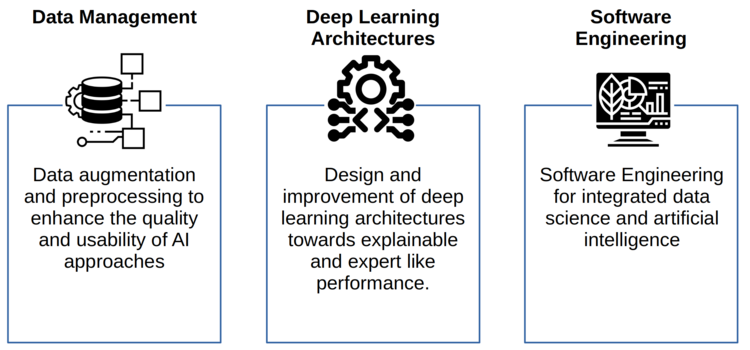Software Engineering for Applied Data Analytics and Artificial Intelligence
"Towards a new generation of communicating AI systems and rapidly deployable data analytics systems."

Our Vision
Imagine a hypothetical scenario in which we seek medical attention in a hospital for an illness. After an initial examination by a doctor, the relevant departments are called in with their respective experts. These experts share their knowledge in order to jointly develop an optimal and individual treatment for our ailment. In this way, the experts benefit from shared insights and expand their expertise through a comprehensive understanding of the situation.
Now imagine this analogous process in the field of data analysis. Modern data analysis methods and artificial intelligence (AI) systems are typically focused on narrow areas of expertise. However, if these systems were able to collaborate and support each other, much like medical experts, we would see a significant increase in the effectiveness and utility of such systems.
If we further imagine that these described systems are explainable and can be quickly transferred into application, this would have a massive effect on many areas, such as medical care.
Our Focus
The focus of the Software Engineering for Applied Data Analytics and Artificial Intelligence Group comprises:

Ongoing and completed projects
Time Series:
- Assessment of Quality Metrics for Synthetic Time Series Data
- Development of a Versatile Deep Learning Architecture for Time Series Analysis, Encompassing Imputation, Classification, and Forecasting
- Validation and Enhancement of Deep Learning Architectures for Time Series Analysis
Medicine:
- Prognostication of Heart Failure Incidence
- Clustering Patterns in Acute Heart Failure Cases
- Segmentation and Categorization of Chronic Wounds
- Creation of a Digital Medical Application for Monitoring Chronic Wound Progression (DiGa)
- Prediction of Anxiety Levels in Psychological Context
- Sensor Systems for the Monitoring of Human Vital Signs
Sport Science:
- Modeling Human Performance in Sports
- Assessing the Accuracy of Fitness Tracker Devices
Nature:
- Utilizing Deep Neural Network Regression for Generating Normalized Digital Surface Models
- Forecasting Bee Mortality Rates
Team
Robert Leppich, M.Sc.
(Group Lead)
Dr. André Bauer
(External Advisor)






